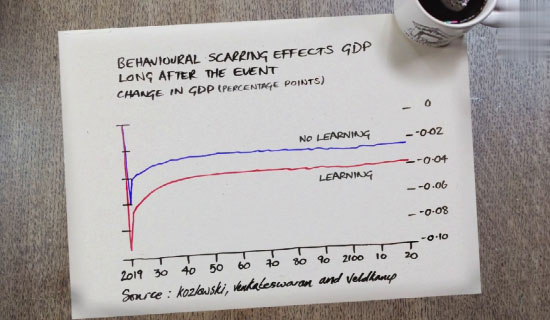
Fear affects our behaviour.And our behaviour affects the economy, both in the short run and in the long run.For example, a recent paper by Austan Goolsbee and Chad Syverson found that foot traffic to businesses fell 60 percentage points earlier this year,but that legal restrictions accounted for only seven percentage points of that.The rest was done voluntarily by people who wanted to avoid infection.And it was strongly correlated to the number of coronavirus deaths in the area.They were able to look at areas that fell within a commuting zone,but that sat on boundaries with different policies on the shutdown.
But the effects of fear will last far longer because now that folks are going through this pandemic,they will assume that the probability of another pandemic is higher than beforehand.I know that many people in the US, in December or even January,
didn't think we would see a shutdown like this.Julian Kozlowski, Venky Venkateswaran, and Laura Veldkamp have created a model that looks at the long-term effects of this "behavioural scarring," as they call it. You can see that the line labelled no learning estimates the effect on GDP, if people did not change their behaviour at all after the pandemic.This would assume that people are perfectly rational. But we know that's not the case.
Anecdotally, people who lived through the Great Depression saved more and were more thrifty throughout their lives. Similarly, there was less trust in large banks after the 2008 financial crisis than there had been before. So when a large event like this happens, people change their behaviour. And they do so by becoming less comfortable with taking risks. Businesses may be less willing to invest money into researching a new product or hiring more people. And it happens at all levels. A worker who was laid off might be less willing to open their own business because that would involve taking out a loan. And it's hard to make it on your own. These are the things that create innovation and growth in the economy. And an unwillingness to take on the risk that comes with them will have a negative impact. One way to mitigate the impact, as the paper's authors point out, is to enact credible policy that mitigates the economic effects. I say "credible" because, again, we're talking about people's perceptions and the decisions that they make based on those perceptions. This could mean reducing the number of bankruptcies or developing a robust testing and tracing system.
Counterintuitively, it would mean spending more in the short-term, but it would improve the long-term effects of fear on the economy.
From:BBE English


